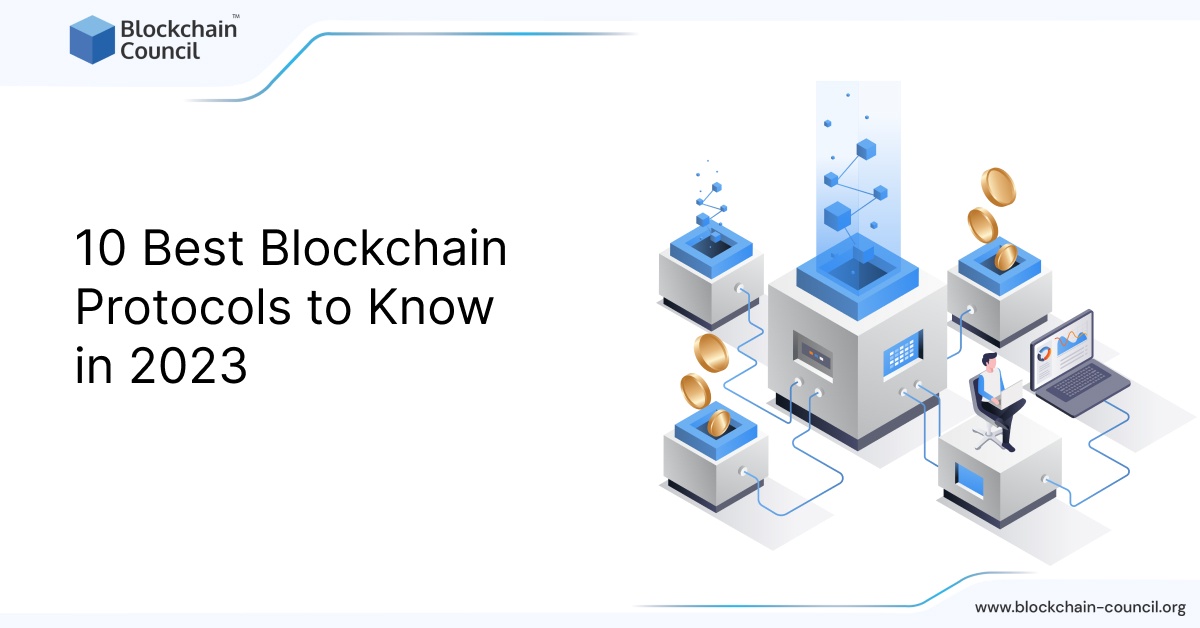The protocols that support blockchain are what makes it revolutionary. A blockchain protocol is a collection of rules and guidelines that govern how the blockchain network operates, how transactions are validated, and how participants reach consensus. These protocols ensure the blockchain's distributed ledger is secure, transparent, and immutable. Blockchain protocols facilitate peer-to-peer interactions without intermediaries, revolutionizing numerous industries and use cases.
The fundamental principles of blockchain protocols are decentralization, consensus mechanisms, cryptographic security, and transparency. Collectively, these principles ensure that the blockchain network is resistant to attacks, prevents double-spending, and provides participants with a shared and auditable view of the data.
Top 10 Protocols of Blockchain
Various blockchain protocols have emerged, each with distinct characteristics and use cases. Ethereum, which introduced smart contracts and decentralized applications (dApps), is one of the most prominent blockchain protocols. Bitcoin, the pioneer of blockchain technology, was designed predominantly as a digital currency. Other protocols, such as Cardano, Polkadot, and Binance Smart Chain, have gained popularity due to their innovative approaches to scalability, interoperability, and DeFi (Decentralised Finance) applications.
As Blockchain technology evolves, these protocols will play a crucial role in influencing the future of decentralized applications, the Internet of Things (IoT), supply chain management, finance, healthcare, and many other industries. Blockchain protocols are at the vanguard of the digital revolution because they have the potential to disrupt conventional systems and give individuals more control over their data and assets. Top 10 protocols are:
Ethereum 2.0 (ETH)
Ethereum 2.0, or Eth2, significantly enhances the Ethereum blockchain. This protocol is primarily concerned with scalability and energy efficiency issues. Ethereum 2.0 replaces the energy-intensive proof-of-work (PoW) consensus mechanism with a proof-of-stake (PoS) consensus mechanism. It introduces fragment chains, which enable the network to process multiple transactions in parallel, thereby substantially enhancing scalability. In addition, Ethereum 2.0 introduces the notion of "economic finality," which expedites transaction confirmation and improves the overall user experience.
Polkadot
Polkadot (DOT) is a multi-chain blockchain protocol that facilitates interoperability between various blockchains. Its heterogeneous multi-chain architecture enables different specialized blockchains, known as parachains, to securely communicate and exchange data. This interoperability facilitates the seamless transfer of assets and data between blockchain networks. The governance system of Polkadot also enables token holders to participate in decision-making, thereby ensuring the protocol's ongoing development and evolution.
Cardano (ADA)
Cardano (ADA) is a blockchain protocol of the third iteration that emphasizes research-driven development and sustainability. It utilizes a layered architecture separating the settlement and computation layers, enhancing scalability and flexibility. Cardano employs the Ouroboros proof-of-stake consensus mechanism, which ensures energy efficiency and network security. The peer-reviewed methodology of the protocol and formal verification of smart contracts are intended to provide a secure and robust platform for decentralized applications.
Solana (SOL)
Solana (SOL) is recognized for its high-performance blockchain, which can process thousands of transactions per second. It combines a proof-of-history (PoH) mechanism with a proof-of-stake (PoS) consensus algorithm. This hybrid approach results in quick transaction settlement and low transaction fees, making Solana an attractive option for developers building high-throughput applications, particularly in the decentralized finance (DeFi) sector.
Avalanche (AVAX)
Avalanche is a protocol designed to provide high scalability, rapid transaction settlement, and low transaction fees. It reaches consensus via the Avalanche consensus algorithm, a novel approach in which validators deliberate on conflicting transactions, resulting in the quickest possible agreement on the validity of new blocks. Due to its unique consensus mechanism, Avalanche is an efficient platform for decentralized applications, particularly for DeFi and asset tokenization use cases.
Filecoin (FIL)
The Filecoin (FIL) blockchain protocol addresses the demand for decentralized storage solutions. It rewards participants with FIL tokens for providing and utilizing unused storage space on the network. Proof-of-spacetime (PoSt) is the consensus mechanism used by Filecoin to ensure that participants maintain their allocated storage space over time. This decentralized storage network provides a cost-effective and secure alternative to conventional cloud storage systems.
NEAR Protocol
NEAR Protocol seeks to make blockchain technology more accessible to developers and consumers. It employs a sharded blockchain architecture, which increases scalability and reduces the load on validators. NEAR uses a proof-of-stake (PoS) consensus mechanism with a unique feature called "Nightshade," which permits multiple nodes to concur on transactions without compromising security. NEAR's user-friendly interfaces and developer tools facilitate the widespread adoption of decentralized applications.
Algorand (ALGO)
Algorand (ALGO) is a blockchain protocol distinguished by its pure proof-of-stake (PPoS) consensus mechanism, guaranteeing decentralization, security, and scalability. The unique block proposal mechanism of Algorand enables it to achieve fast block confirmation times and a high transaction volume. This protocol's emphasis on speed and security makes it suitable for various applications, including supply chain management and financial services.
Harmony (ONE)
Harmony (ONE) is a sharded blockchain protocol optimized for high throughput and low latency. It implements a secure and energy-efficient proof-of-stake (PoS) consensus mechanism called Effective Proof-of-Stake (EPoS). The sharding architecture of Harmony enables it to simultaneously process multiple transactions, attaining scalability while upholding decentralization. This protocol is particularly suitable for applications requiring fast and seamless transactions.
Celo (CELO)
Celo (CELO) is a blockchain protocol designed to bring financial services to the world's unbanked and underbanked populations. It employs a hybrid consensus mechanism combining proof-of-stake (PoS) and proof-of-work (PoW) to ensure decentralization and security. The main net of Celo, known as the Celo platform, enables the creation of stablecoins and the development of mobile-first decentralized applications, making it a key player in promoting financial inclusion.
Blockchain Council and Protocols
In the rapidly evolving world of blockchain technology, staying abreast of the most recent developments is essential. Blockchain specialists and certified blockchain professionals play a vital role in this industry, as they possess the in-depth knowledge and expertise necessary to design and implement blockchain solutions effectively. Blockchain certification online courses facilitate the acquisition of blockchain development expertise by providing comprehensive training and hands-on experience in blockchain development.
Organizations such as the Blockchain Council play a crucial role in delivering these certifications and training, serving as a credible platform ensuring blockchain education's quality and credibility. With a concentration on cutting-edge blockchain protocols, the Blockchain Council equips aspiring blockchain developers with the skills and knowledge to excel in the blockchain industry. By offering specialized blockchain developer training and promoting Blockchain education, the Blockchain Council empowers professionals to become certified blockchain professionals who can contribute to the advancement of blockchain technology and its pervasive adoption.
Conclusion
Novel protocols such as Ethereum 2.0, Polkadot, and Cardano are at the vanguard of innovation in the blockchain ecosystem, which is constantly evolving. These protocols offer distinct features, scalability solutions, and interoperability, propelling the adoption of blockchain technology in various industries. To leverage the potential of blockchain, individuals can become blockchain specialists and certified blockchain professionals by enrolling in reputable blockchain certification online courses. Organizations like the Blockchain Council play a crucial role in providing comprehensive training and ensuring blockchain education quality.
Through specialized Blockchain developer training, these certification courses equip professionals with the necessary skills to effectively design and implement blockchain solutions. As blockchain technology continues to revolutionize industries worldwide, the combination of cutting-edge protocols and well-trained professionals will undoubtedly accelerate blockchain's widespread adoption and transformative impact in the years to come.


No comments yet